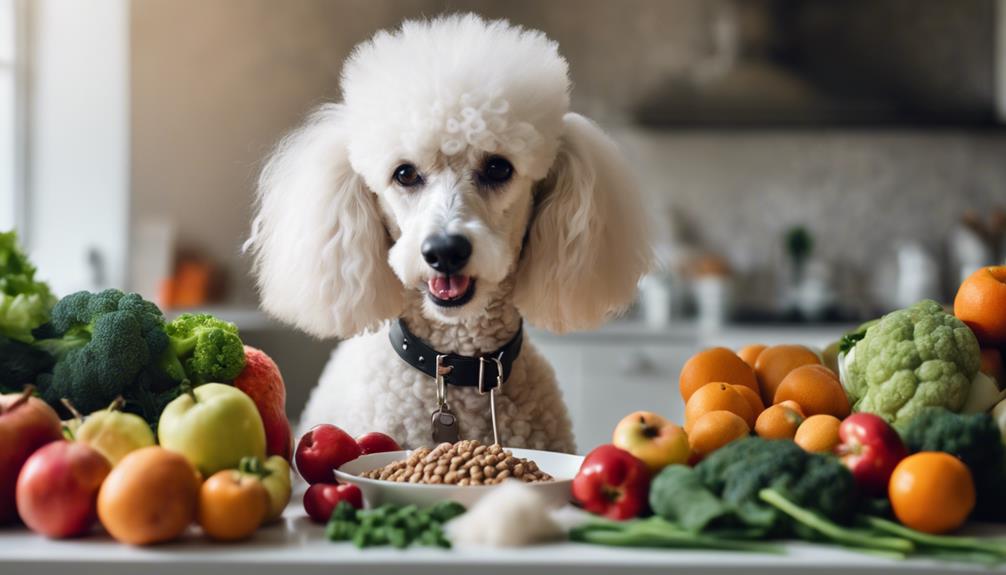When it comes to choosing an organic diet for your poodle, the grass may seem greener on the other side, but is it really? The debate around whether organic diets are truly better for your furry companion continues to intrigue pet owners and professionals alike. By exploring the intricacies of organic nutrition for poodles, you might uncover surprising insights that could impact your beloved pet's well-being in ways you never considered.
Key Takeaways
- Organic diets enhance Poodles' overall health and well-being.
- Transitioning gradually prevents digestive issues when switching to organic food.
- Ingredient quality and sourcing prioritize natural, sustainable, and healthy components.
- Nutritional benefits include improved digestion, nutrient absorption, and essential nutrient provision.
Pros of Organic Diets for Poodles

Organic diets for Poodles offer numerous benefits that can positively impact their overall health and well-being. When considering your pet's diet, opting for organic food can lead to significant improvements in various aspects of your dog's health. Organic pet food is made from high-quality ingredients, which can result in a shinier coat and healthier skin for your Poodle. Additionally, these diets may assist in helping your Poodle maintain a healthy weight and provide them with increased energy levels to enjoy their daily activities.
Furthermore, organic foods can contribute to brighter eyes and aid in easier digestion for your pet. Poodles on organic diets often experience improved stool quality, leading to better overall digestive health and reducing the risk of upset stomachs. By choosing organic pet food production, you are eliminating preservatives, modifications, and chemicals from your Poodle's diet, promoting their overall well-being and longevity.
Cons of Organic Diets for Poodles

Organic diets for Poodles might strain your budget due to higher costs and limited availability. Scientific backing for the superior health benefits of organic diets for Poodles remains scarce. Be cautious about potential digestive issues when transitioning your Poodle to an organic diet.
Cost of Organic Food
Considering the higher prices associated with organic pet food, the financial feasibility of implementing an organic diet for Poodles requires careful evaluation by pet owners. When contemplating the cost of organic food for your furry companion, it's essential to consider the following:
- Variability in Prices: Organic pet food can be more expensive than conventional options, influenced by factors like brand and ingredients.
- Prohibitive Costs: The cost of organic diets for Poodles may be too high for some pet owners, impacting the long-term sustainability of such a diet.
- Reasons for Higher Costs: Sourcing organic ingredients, production methods, and certifications all contribute to the elevated price of organic pet food.
- Long-Term Consideration: The significant price difference between organic and non-organic pet foods can affect your budget over time, warranting careful financial planning.
Limited Nutritional Research
When examining the feasibility of incorporating an organic diet for your Poodle, it becomes evident that limited research on the nutritional aspects poses a significant challenge. Studies comparing organic and conventional pet foods lack conclusive evidence of superiority in terms of nutritional benefits for poodles. The variations in nutritional content in organic foods further complicate the determination of clear advantages. Specific health impacts of organic diets on poodles remain unclear due to insufficient data and research in this area. To make informed decisions about your poodle's diet, it is essential to consider the current lack of comprehensive research on the nutritional implications of organic diets. More studies are necessary to fully understand the potential benefits or drawbacks of organic diets for poodles.
Digestive Issues Potential
Increased fiber content in some organic poodle diets can potentially lead to digestive issues such as diarrhea or bloating. When considering organic diets for your poodle, be aware of the following:
- Higher Fiber Content: Some organic diets may contain more fiber, which can cause digestive disturbances.
- Gastrointestinal Upset: Abruptly switching to an organic diet can result in gas and loose stools in poodles.
- Harder-to-Digest Ingredients: Certain organic ingredients like fruits or vegetables may be challenging for poodles to digest, leading to discomfort.
- Transition Challenges: Poodles with sensitive stomachs may struggle with the transition to organic foods due to ingredient changes.
Nutritional Benefits of Organic Diets

Opting for organic diets for your poodle can potentially provide distinct nutritional advantages, including heightened levels of antioxidants and omega-3 fatty acids compared to conventional options. Organic diets tend to have slightly increased levels of antioxidants and phosphorus, which can contribute to overall health. Additionally, organic meat and milk used in poodle diets often contain higher concentrations of beneficial omega-3 fatty acids, known for their anti-inflammatory properties.
It is essential to note that the specific nutrient levels in organic pet foods can vary based on the farming methods and practices employed. While there is limited direct evidence on the exact nutritional benefits of organic diets for poodles, they do offer a different nutrient profile compared to conventional diets. This variation in nutrients can potentially support your poodle's well-being and provide a diverse range of essential nutrients that may not be as prevalent in non-organic options.
Potential Health Risks of Organic Diets
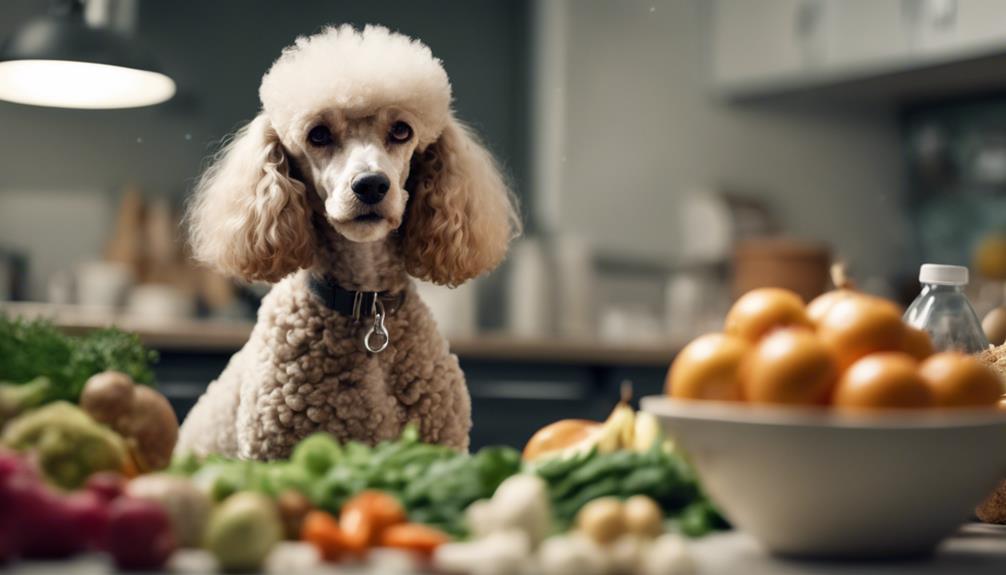
Organic diets for poodles might lead to nutrient deficiencies as a result of limited ingredient options. The potential for higher costs associated with organic pet foods could impact budget constraints. It's essential to weigh the risks and benefits carefully when considering an organic diet for your poodle.
Nutrient Deficiencies
A poodle's health can be compromised by nutrient deficiencies that may arise from an organic diet, impacting crucial aspects like heart health, bone development, and overall well-being. When considering an organic diet for your poodle, it's essential to be aware of potential nutrient deficiencies that could affect their health. Here are some key deficiencies to watch out for:
- Taurine: Crucial for heart health.
- Vitamins D and E: Important for various bodily functions, including bone health.
- Calcium and Phosphorus: Essential for bone development and growth.
- Omega-3 Fatty Acids****: Vital for skin and coat health.
Ensuring your poodle receives these necessary nutrients is vital for their overall health and well-being.
Cost Considerations
Consider the financial implications and potential health risks associated with incorporating organic diets for your poodle. While organic diets can be pricier due to the quality of ingredients used, this increased cost doesn't always guarantee improved health outcomes for your pet. It's essential to note that certain organic ingredients, if not carefully sourced or handled, could still pose health risks to your poodle. Despite the allure of organic options, there's no guarantee that poodles will experience significant health benefits solely from consuming organic diets. Therefore, it's crucial to carefully evaluate the cost of organic diets in relation to the potential health risks and benefits for your beloved poodle to make a well-informed decision.
Environmental Impact of Organic Diets
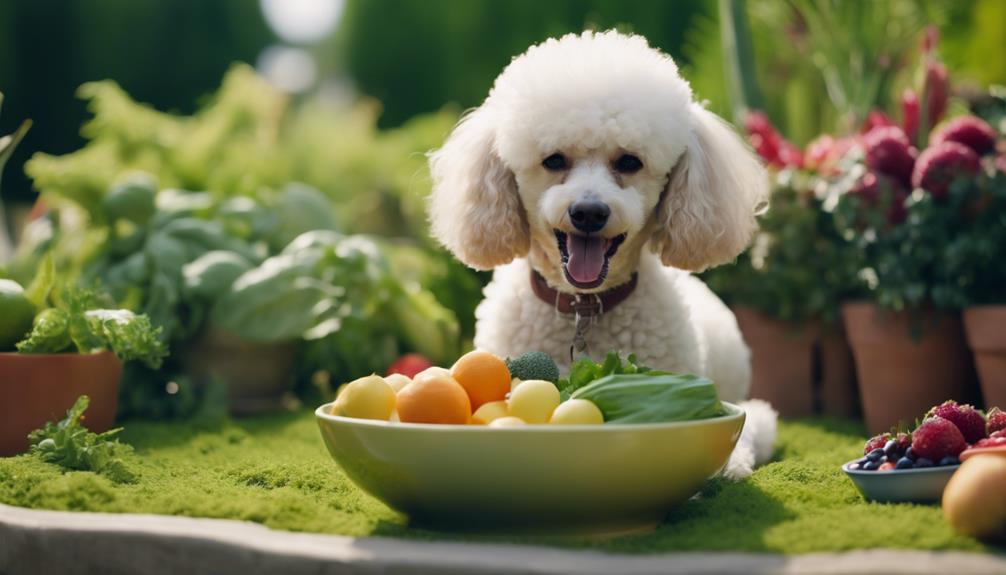
When assessing the environmental impact of organic diets for poodles, it is crucial to evaluate factors such as land use and fossil fuel requirements. Here are some key points to consider:
- Organic diets may require more land and fossil fuels: This is due to lower productivity compared to conventional diets, impacting the overall environmental footprint.
- Variability based on farming methods and food types: The environmental impact of organic diets can differ based on the specific farming practices and types of organic foods being utilized.
- Complex comparisons with conventional farming: Understanding the environmental impact of organic diets involves intricate assessments when compared to conventional farming methods.
- Environmental considerations in decision-making: When choosing between organic and conventional diets for your poodle, it is essential to take into account factors such as land use and fossil fuel requirements to minimize environmental impact.
Careful consideration of these factors can help you make an informed decision regarding the environmental impact of organic diets for your beloved poodle.
Cost Considerations of Organic Diets
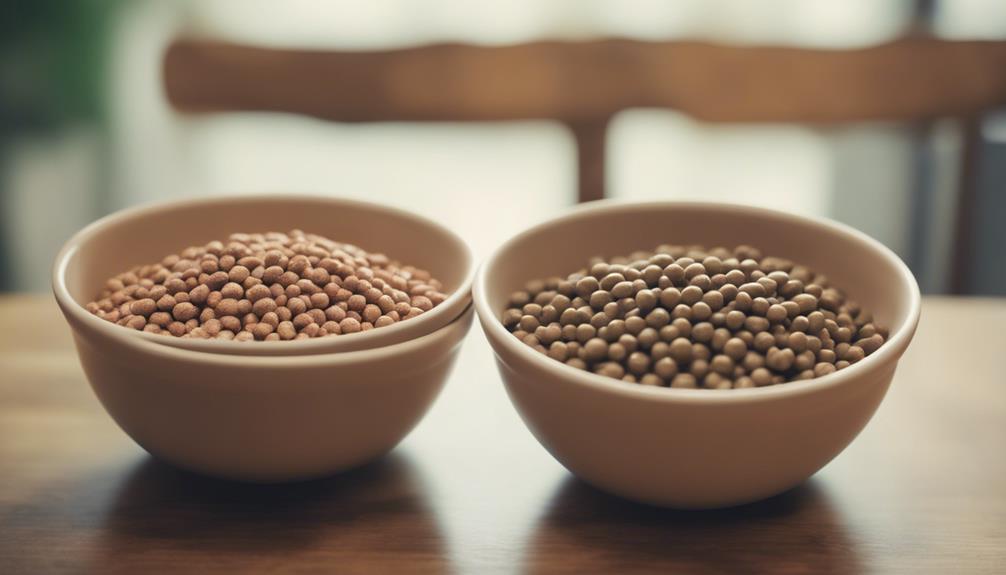
The affordability of organic diets for poodles can significantly impact pet owners' financial decisions when considering their pets' nutrition. While organic diets can offer health benefits, they typically cost between 20-50% more than conventional diets. The price variation depends on the brand and quality of the pet food. The higher costs associated with organic diets stem from the use of organic ingredients in the production process. Despite the increased expenses, the potential health benefits and quality assurance provided by organic diets may justify the higher price tag for some pet owners. However, budget-conscious pet owners must carefully weigh the cost versus benefits of opting for organic diets for their poodles. Understanding the financial implications is crucial in making an informed decision about whether the added cost of organic diets aligns with the desired nutritional standards and health outcomes for your furry companion.
Ingredient Quality in Organic Diets

When considering ingredient quality in organic diets for your Poodle, it is essential to focus on the sourcing of organic ingredients, comparing their nutritional benefits, and considering the environmental impact of their production. By prioritizing organic ingredient sourcing, you ensure that your pet's food is free from harmful chemicals and modifications. Evaluating the nutritional benefits and environmental impact of these ingredients can help in making informed choices for your Poodle's health and well-being.
Organic Ingredient Sourcing
High-quality organic ingredient sourcing is essential for ensuring the purity and sustainability of Poodle diets. When considering organic ingredient sourcing for your furry friend, keep in mind the following points:
- Natural and Sustainable: Organic Poodle diets prioritize ingredients sourced from natural and sustainable farming practices.
- Free from Harmful Substances: Ingredients in organic diets are devoid of synthetic pesticides, herbicides, and GMOs.
- Strict Quality Standards: Organic diets adhere to stringent organic standards, guaranteeing purity and quality in every bite.
- Healthier and Ethical: Opting for organic ingredient sourcing promotes a healthier and more natural diet for your Poodle while supporting ethical and environmentally-friendly food production practices.
Nutritional Benefits Comparison
For optimal health and nutrition in your Poodle, consider the superior ingredient quality offered by organic diets. Organic diets prioritize organic ingredients such as meat, fruits, and vegetables, steering clear of artificial additives and chemicals commonly present in conventional pet foods. This emphasis on natural elements may enhance digestion and nutrient absorption in Poodles. Additionally, organic diets tend to contain elevated levels of essential nutrients like omega-3 fatty acids and antioxidants, which can contribute to your Poodle's overall health and vitality. By opting for organic diets, you are choosing a path that supports your Poodle's well-being through the high-quality ingredients that promote nutrient absorption and overall health.
Environmental Impact Consideration
Considering the environmental impact of ingredient quality in organic diets for Poodles is crucial for making informed pet food choices. When evaluating this impact, keep in mind the following:
- Organic diets can lead to higher environmental impact due to increased land and fossil fuel requirements.
- Lower productivity of organic pet foods compared to conventional options can affect their environmental footprint.
- Factors like food type and farming methods play a significant role in determining the environmental impact of organic diets.
- To choose between organic and conventional pet foods thoughtfully, it is essential to weigh the environmental implications of each. Making environmentally conscious decisions involves understanding the complexities of organic farming methods.
Digestibility of Organic Vs. Non-Organic Diets
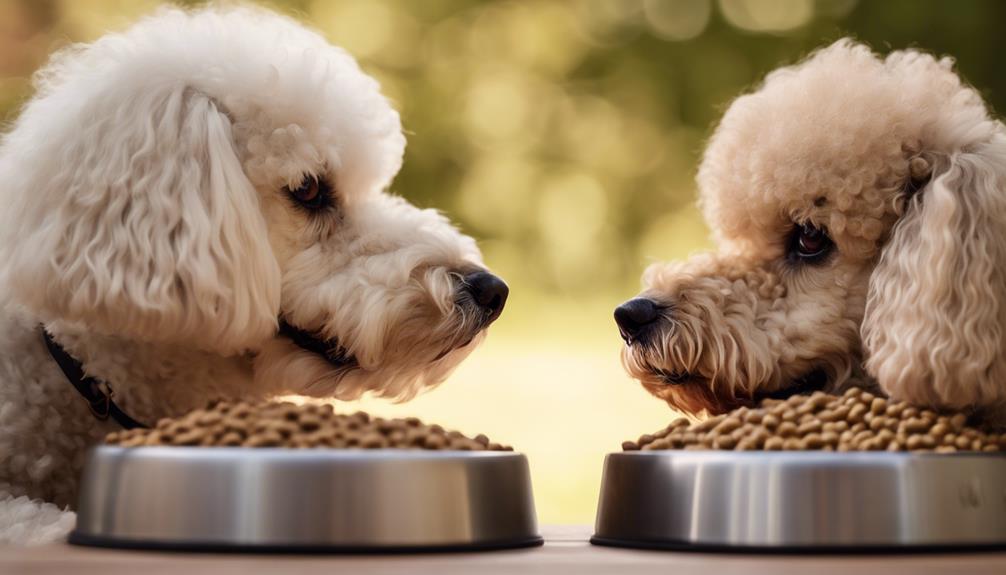
When comparing the digestibility of organic and non-organic diets for Poodles, research indicates a potential advantage in nutrient absorption with organic options. Studies have shown that organic diets may have higher digestibility rates, leading to better nutrient absorption in Poodles. The higher quality ingredients found in organic pet foods are easier for your Poodle to digest, reducing the risk of digestive issues. Additionally, the absence of artificial additives and chemicals in organic diets can contribute to improved gastrointestinal health and overall digestion in your furry companion. By choosing organic pet food, you are promoting better nutrient utilization and absorption, which supports your Poodle's energy levels and overall well-being.
| Organic Diets for Poodles | Benefits |
|---|---|
| Higher digestibility rates | Better nutrient absorption |
| Quality ingredients | Reduced risk of digestive issues |
| Improved gastrointestinal health | Enhanced overall digestion |
| Better nutrient utilization | Support for energy levels |
| Healthy digestive system | Improved nutrient uptake |
Common Misconceptions About Organic Diets
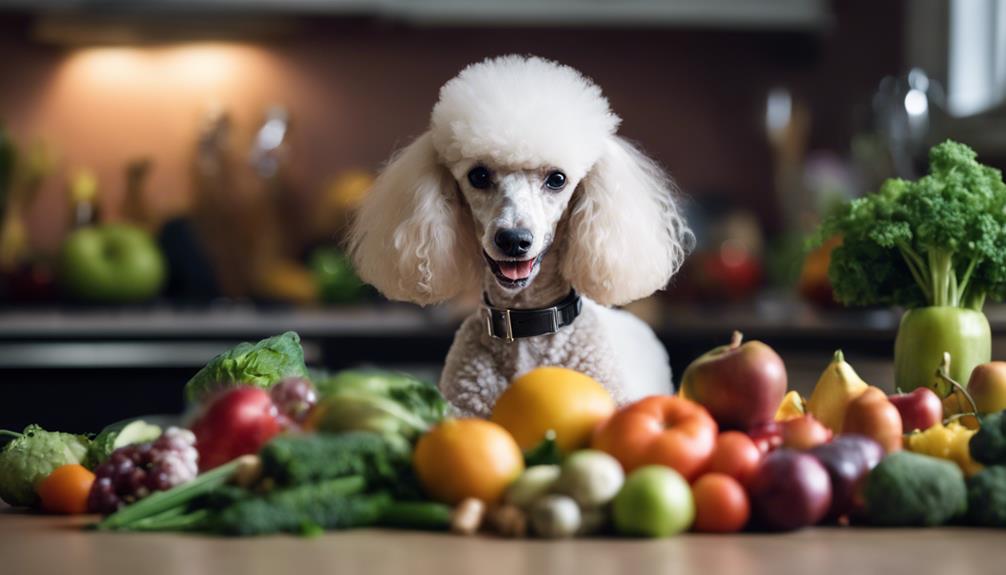
Despite common misconceptions, the health benefits of organic diets for Poodles may not always be as significant as believed, requiring a closer examination of scientific evidence and individual pet requirements. When considering organic diets for your Poodle, it's important to understand the following:
- Limited Scientific Evidence: Research supporting the superior health benefits of organic diets for Poodles over conventional diets is scarce, indicating a need for further investigation.
- Misconception of Higher Nutritional Value: Simply being labeled as organic does not guarantee that the diet offers better nutritional value or improved health outcomes for your pet.
- Individual Pet Needs: The decision to opt for organic pet food should be based on your Poodle's specific nutritional requirements and preferences rather than assumptions of superiority.
- Ingredient Quality and Balance: Some pet owners assume organic diets are superior without considering factors like ingredient quality, nutritional balance, and the unique health needs of their pets.
Understanding the actual nutritional content and benefits of organic diets for Poodles can assist you in making informed decisions tailored to your pet's individual health and dietary needs.
Transitioning to an Organic Diet

When transitioning your Poodle to an organic diet, it's crucial to do so gradually to prevent digestive issues. Begin by mixing small amounts of organic food with their current diet, increasing the ratio over 7-10 days. Monitor your Poodle's well-being closely throughout the process, including their stool quality, energy levels, and overall health.
Benefits of Organic
Transitioning to an organic diet for your Poodle can lead to a range of benefits, including improved skin and coat appearance, higher energy levels, and better overall health indicators. When you switch to organic ingredients, you are providing your Poodle with a nutritionally dense diet that can positively impact their well-being. Here are four benefits of transitioning to an organic diet for your Poodle:
- Improved Skin and Coat: Organic diets can enhance the appearance of your Poodle's skin and coat.
- Higher Energy Levels: Your Poodle may experience increased energy levels, supporting a more active lifestyle.
- Better Weight Management: Organic foods can help your Poodle maintain a healthier weight by offering balanced nutrition.
- Enhanced Digestion: Organic diets can lead to better digestion, improved stool quality, and a reduced risk of upset stomach for your Poodle.
Poodle Diet Considerations
Considering the nutritional requirements of your Poodle, how can you effectively introduce an organic diet to promote their well-being? When transitioning to organic foods for your Poodle, it's essential to do so gradually to avoid digestive issues. Begin by mixing small amounts of organic food with their current diet, monitoring for any adverse reactions. Since Poodles come in different sizes, tailor the portion sizes accordingly. Consult your veterinarian for personalized advice on transitioning your Poodle to an organic diet that suits their specific needs. Keep a close eye on your Poodle's energy levels and overall health during the transition phase to ensure a smooth adjustment.
| Organic Diet Transition Tips |
|---|
| Transition gradually to prevent digestive upset |
| Mix small amounts of organic food with current diet |
| Consult veterinarian for personalized advice |
Transitioning Tips for Organic
To effectively transition your Poodle to an organic diet, gradually introduce small amounts of organic food mixed with their current diet to prevent digestive upset. Here are some tips to help you with the process:
- Monitor Your Poodle's Reaction: Look for changes in stool quality, energy levels, and overall health.
- Gradual Increase: Slowly increase the amount of organic food while decreasing the regular food over 7-10 days for a smooth transition.
- Watch for Allergies: Pay attention to any signs of allergies or sensitivities when transitioning to organic food.
- Stay Hydrated: Provide fresh water at all times to support hydration and overall well-being.
Organic Treat Options for Poodles

When selecting organic treat options for your Poodle, prioritize treats made with ingredients like chicken, beef, sweet potatoes, and blueberries for a healthier snacking choice. Organic treats for Poodles can offer a range of benefits. These treats are often free from artificial colors, flavors, and preservatives, making them a healthier snack option for your furry friend. Additionally, some organic treat brands provide grain-free options, which can be advantageous for Poodles with food sensitivities or allergies.
Organic treats not only contribute to your Poodle's health but also offer a variety of flavors and textures to keep them engaged and satisfied during training sessions or as a reward for good behavior. By including organic treats in your Poodle's diet, you can support their overall health and well-being, aiding in aspects such as energy levels, digestion, and weight management. Choose organic treats thoughtfully to ensure your Poodle receives the best snacking experience possible.
Homemade Vs. Store-Bought Organic Foods
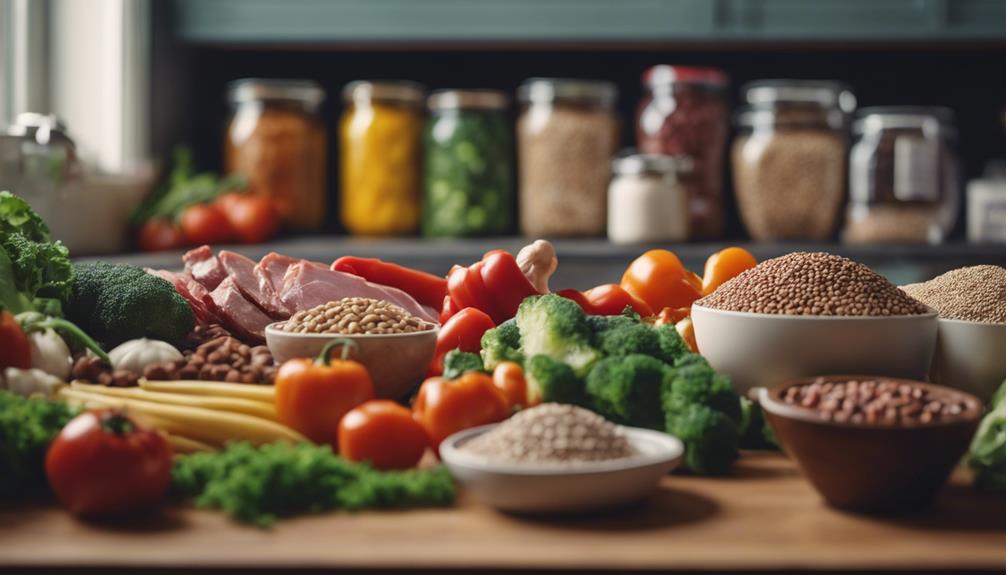
As you explore the realm of organic diets for your Poodle, a key decision to make is whether to opt for homemade or store-bought organic foods. Here are some essential points to consider when deciding on the best food option for your furry companion:
- Homemade organic foods: By preparing meals at home, you have full control over the ingredients and their quality. This allows you to cater to your Poodle's specific dietary needs and preferences.
- Store-bought organic foods: These options offer convenience and often come with an organic seal, ensuring they meet certain quality standards. They are formulated to provide balanced nutrition for your Poodle.
- Both homemade and store-bought organic foods can contribute positively to your Poodle's overall health and well-being.
- When choosing between homemade and store-bought organic foods, consider factors such as your Poodle's dietary requirements, your lifestyle, and the time you can dedicate to meal preparation. Ultimately, the best choice is the one that aligns with your Poodle's needs and your capabilities.
Age and Size Considerations for Organic Diets

Consideration of age and size plays a crucial role in determining the optimal organic diet for your Poodle. Poodle puppies have specific needs, requiring higher protein and calorie intake to support their growth and development. For senior Poodles, the best organic diets are tailored to promote joint health and overall well-being. Toy Poodles, due to their smaller size, may benefit from portion control and nutrient-dense organic foods to meet their nutritional requirements effectively. Adjusting organic diets based on the life stage and size of your Poodle ensures they receive the necessary nutrients for their well-being. Consulting a vet is the best approach to determine the specific organic diet requirements for your Poodle based on their age and size. By considering these factors, you can provide your Poodle with the most suitable and beneficial organic diet to support their health and vitality.
Organic Diet Supplements for Poodles

Organic diet supplements for Poodles enhance their overall health and well-being by providing essential nutrients such as organic flaxseed, coconut oil, and kelp. When considering these supplements for your furry friend, keep in mind the following:
- Nutrient-Rich Ingredients: Organic supplements can contain beneficial components like organic flaxseed, which is a great source of omega-3 fatty acids important for skin and coat health.
- Vitamins and Minerals: These supplements often offer a blend of vitamins and minerals crucial for your Poodle's immune system, energy levels, and overall vitality.
- Natural and Holistic Approach: By opting for organic diet supplements, you can avoid synthetic additives and artificial colors, promoting a more natural and holistic approach to your Poodle's nutrition.
- Quality Matters: Choose reputable brands known for their high-quality organic ingredients to ensure the effectiveness and safety of the supplements you introduce into your Poodle's diet.
Incorporating organic supplements into your Poodle's diet can help bridge nutrient gaps and elevate the nutritional content of their meals, supporting their well-being in a wholesome manner.
Consulting a Vet About Organic Diets

Consulting a veterinarian about organic diets for your poodle can provide valuable insights into their specific nutritional needs and overall health requirements. Veterinarians play a crucial role in assessing the suitability of organic food for your poodle based on individual health factors. They can offer guidance on ensuring that the organic diet meets essential nutrient requirements, taking into account any allergies, sensitivities, or health conditions your poodle may have. Additionally, vets can recommend specific organic brands or ingredients that align with your poodle's dietary preferences and health goals. Regular consultations with a vet are essential to monitor your poodle's response to the organic diet and make any necessary adjustments for optimal health outcomes.
| Benefits of Consulting a Vet About Organic Diets | |
|---|---|
| Personalized nutritional guidance | Identification of allergies and sensitivities |
| Recommendations on suitable organic brands | Monitoring health response to organic diet |
Frequently Asked Questions
What Is the Best Diet for a Poodle?
For your Poodle, the best diet involves raw feeding, homemade meals, and grain-free options. Prioritize high-quality animal protein, avoid fillers, and select size-specific formulas. Opt for moderate to high protein content and healthy fats for their well-being.
Does Organic Dog Food Make a Difference?
When considering organic dog food, you might find slight health benefits like antioxidants. However, cost comparison may show higher prices. Environmental impact varies, with organic foods often having lower pesticide residue and supporting sustainable practices.
What Kind of Food Is Best for Poodles?
For Poodles, the best food options include raw feeding for optimal nutrients, grain-free choices to avoid allergies, and homemade meals for control. These options cater to their needs and can support their health and well-being.
Are Organic Treats Better for Dogs?
Organic treats for dogs offer nutritional benefits that support overall health. They reduce environmental impact by avoiding harmful chemicals. Dogs often enjoy the taste. Opting for organic shows love for your pet's diet.
Conclusion
In conclusion, incorporating organic diets into your poodle's nutrition plan can have numerous benefits for their overall health and well-being. For example, a poodle named Bella switched to an organic diet and experienced shinier fur, increased energy levels, and better digestion. By making informed choices about your poodle's diet and consulting with a vet, you can help them live a happier and healthier life.
